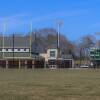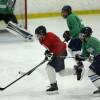Racist and homophobic chants in the grandstands. Hazing, bigoted language and worse in the locker room.
Coaches violating boundaries. Hushed-up investigations. Brawling adults — in one recent case, on the ice during a youth hockey game.
More Commentary
The headlines around youth sports have been disturbing lately, and the winter sports season is just getting started. But as fingers get pointed in every direction — at athletes, coaches, administrators and supporters, all caught behaving badly — let’s not overlook or underestimate the power of youth sports to make a positive impact on our children, schools, and communities.
I am not naïve about the ugliness that’s out there. I have been running an urban baseball program, the Boston Astros, since 1978 (now incorporated into The BASE, our Roxbury-based sports-training and academic-prep program). I have sent travel teams all over the country in baseball, basketball and softball. Our teams are overwhelmingly Black and Latinx. Typically, they look nothing like the teams they compete against.
My players have also experienced the best and worst sports has to offer.
During one Virginia baseball tournament, our team was beating a local favorite, and our dugout was filled with positive chatter — mostly in Spanish. From the opposing dugout and the stands behind us came the chant, “Where’s your green card?” Offensive, shocking and disappointing.
But then something unexpected happened.
Coaches and players from an all-white Connecticut team overheard the taunts and reached out to us, offering their support. Afterwards, surrounded by players’ parents, we invited them to our annual National Urban Baseball Classic. They accepted and spent a week in Boston, playing against and mingling with other urban baseball teams. At closing ceremony, their players and coaches said playing and being in Boston was the highlight of their season.
I could cite many such examples of character building through competitive sports, on and off the field. But what I really want to focus on is how youth sports help bridge gaps separating us by race, gender, generation, wealth and zip code. Look no further than Greater Boston, where resources and opportunities are unevenly distributed, to put it mildly.
We can all do better at leveling that playing field. With a committed public-private partnership, we will, too. In fact, we must.
Our city already boasts more than 30 sports-centric nonprofits, making Boston a national leader in sports-based youth development. Nevertheless, we have no unified network or governing body highlighting the powerful, and positive, role that sports play in young people’s lives.
If we did, these organizations might do better at sharing best practices. At leveraging our network to increase the total number of urban youths served. At advocating for better fields and facilities in underrepresented neighborhoods. At ensuring that our public officials and professional sports franchises engage more directly on these issues.
Add these up, and we could be expanding the power of youth sports to build the next generation of community leaders.
Several of us are already working towards that goal.
Joining The BASE in this effort are Boston Scores, Sportsmen’s Tennis & Enrichment Center and All Dorchester Sports & Leadership. We hope other like-minded nonprofits will get onboard, and soon. Because, as the COVID-19 pandemic has reminded us, serving our young people’s social-emotional needs has never been more important.
When I look back on that Astros team that competed in Virginia, what do I see? I see more than 15 future college graduates, many of whom have played college ball, and one MLB draftee.
I see former teammates now running their own businesses or working in a variety of professions, building great futures for themselves and their families.
I see program alumni returning to The BASE time and again, mentoring our younger student-athletes and paying it back by paying it forward.
Mostly I see the positive power of youth sports at work, long after those ugly chants have faded away.
Robert Lewis, Jr., is the founder and president of The Base.








